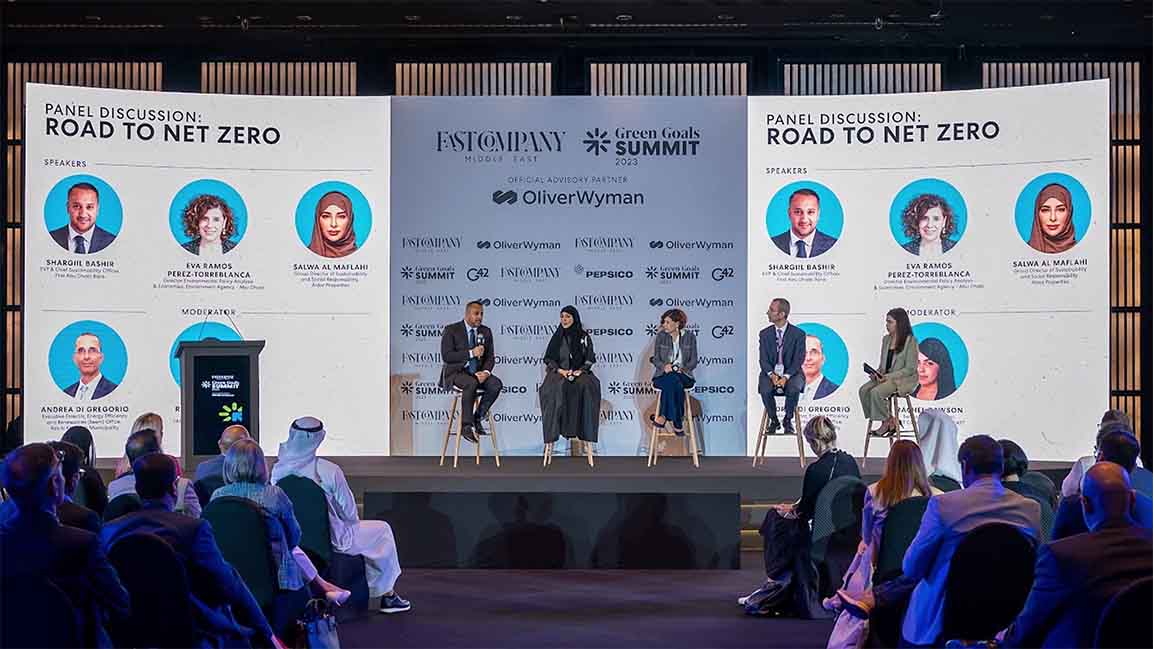- | 8:00 am
Will COP28 be solution-driven? Experts at the Green Goals Summit urge to seize the opportunity
From the role of public and private sector collaboration to accelerating research and innovation, and setting accountability measures – it’s become clear that there’s a need to foster bold and impactful moves to ensure a sustainable future.

Addressing climate change is a global responsibility – and at Fast Company Middle East’s Green Goals Summit, it’s not just talking about making better solutions but creating concrete roadmaps and taking action.
Gathering some of the region’s most innovative policymakers, business, and government leaders in the realm of sustainability, the summit explored thought-provoking ideas and solutions that are stirring climate change issues.
From the role of public and private sector collaboration to accelerating research and innovation and setting accountability measures – it’s become clear that there’s a need to foster bold and impactful moves to ensure we can all contribute to a sustainable future.
Here are a few takeaways from the summit:
THE PRICE TO PAY

(From left to right) Shargiil Bashir, EVP & Chief Sustainability Officer, First Abu Dhabi Bank; Salwa Al Maflahi, Group Director of Sustainability and Social Responsibility, Aldar Properties; Eva Ramos Perez-Torreblanca, Director Environmental Policy Analysis & Economics, Environment Agency – Abu Dhabi; Andrea Di Gregorio, Executive Director, Energy Efficiency and Renewables (Reem) Office, Ras Al Khaimah Municipality; and Rachel Dawson, Senior Correspondent, Fast Company Middle East
Is net zero possible by 2050? According to a live poll, 95% of our audience doesn’t think so — and our panelists agree that stakeholders are willing to pay higher prices for sustainable products and services, encouraging businesses to invest in them.
Addressing the audience, Shargiil Bashir, EVP & Chief Sustainability Officer, First Abu Dhabi Bank, said that “sustainability at its heart” is critical for businesses to succeed and contribute to net zero. “The biggest companies in the Middle East have already started looking into sustainability because it offers them a big business opportunity,” he says.
Throwing light on UAE’s plans for reducing emissions and generating investments in the sector, Eva Ramos Perez-Torreblanca, Director of Environmental Policy Analysis & Economics, Environment Agency, Abu Dhabi, adds that the government of UAE had partnered with 26 organizations and was finding out what can be done.
“We are looking at solutions, and hopefully, we will be able to work on them soon.”
While there is a dire need for investment in sustainability models, many hurdles exist. Andrea Di Gregorio, Executive Director, Energy Efficiency and Renewables (Reem) Office, Ras Al Khaimah Municipality, notes, “Regulation on the road to net zero is fundamental. We need to allow projects with a clear business case.”
Highlighting the importance of incentivization, awareness, and collaboration, Salwa Al Maflahi, Group Director of Sustainability and Social Responsibility Aldar Properties, also talks about the challenges in financing, “There is a problem of financing, but when companies realize the value of sustainability, they invest in it fully.”
CHANGE STARTS AT THE TOP

Johnny Ayoub, Partner and Head of Climate & Sustainability for India, the Middle East and Africa, Oliver Wyman
Action and transparency are necessary when it comes to assessing environmental degradation. This needs concrete leadership support, says Johnny Ayoub, Partner and Head of Climate & Sustainability for India, the Middle East, and Africa, Oliver Wyman.
Looking at key findings from a report Oliver Wyman published in collaboration with the World Government Summit, Ayoub commended government-led initiatives to restore natural-related loss in the Middle East region as something that government entities and the private sector note.
In contrast, he noted how the private sector needs to improve on creating solutions for nature-related loss. “It’s important to move forward to have those science-based frameworks that would help corporations act on nature-related risks,” says Ayoub, introducing a framework called the Taskforce on Nature-related Financial Disclosures.
The framework is designed to help Middle East businesses to assess, report, and act on nature-related opportunities. With the right framework, the private sector can further support efforts to tackle climate change issues. At the same time, financial institutions can also be encouraged to invest and allocate capital if nature-related opportunities and needs are quantified.
WALKING THE TALK

(From left to right) Wael Ismail, Vice President, Corporate Affairs MENA and South Asia, PepsiCo; Dr. Prashanth Marpu, VP of R&D, Bayanat; Khaled Al Huraimel, Group CEO, BEEAH; Christina Struller, Vice President of Corporate Affairs – ISMEA, UPS; and Karrishma Modhy, Managing Editor, Fast Company Middle East
As the UAE gears up to host the upcoming COP28, the panel discussed the need to seize the opportunity that the conference brings for public-private partnerships and to focus on the most vulnerable communities of the world.
“COP28 will offer us unique opportunities to engage many different stakeholders, government entities, and the private sector, not just in the UAE but also in other countries of the region,” says Khaled Al Huraimel, Group CEO, BEEAH.
Calling COP28 a “solution-driven COP,” Christina Struller, Vice President of Corporate Affairs – ISMEA, UPS, says it will allow the world leaders to focus on developing countries and looking at populations hardest hit by climate change. “If political will and stakeholders unite, it can be fruitful.”
Dr. Prashanth Marpu, VP of R&D, Bayanat, says setting standards for accountability to measure ESG is crucial to advancing the goal. “Governments or private agencies can develop a standard for these metrics so that there is no data manipulation,” he says.
Wael Ismail, Vice President, Corporate Affairs MENA and South Asia, PepsiCo, points out that the conversation should not be limited to what will happen at COP28 but also be focused on what can be done further. “It will be the first stock-take after the Paris Agreement. It is time to focus more on youth and innovation to drive our journey collectively.”
KEEPING IT IN THE LOOP

(From left to right) Vikram Krishna, Co-Founder, Sacred Groves; Dr Stephen Wilkinson, Head of the Smart and Sustainable Cities Research Cluster and Associate Professor, University of Wollongong in Dubai (UOWD); Priya Sarma Mathur, Senior Sustainability Head at Unilever, Chair of the Circular Packaging Association; Florence Bulte, Chief Sustainability Officer, Chalhoub Group; and Karrishma Modhy, Managing Editor, Fast Company Middle East
The circular economy offers a promising solution to reduce environmental impact, but is it possible? Experts agree but add the crucial role of collaboration among various stakeholders.
“Governments have a critical role in legislation,” says Vikram Krishna, Co-Founder of Sacred Groves. Give legislation in other countries as an example, such as Ecuador’s new bill recognizing nature as a legal person. “It’s critical to include this everywhere. Because today, if you extract from nature, it’s a civil offense worldwide.”
Technology also plays a part; however, it has its limits, says Dr. Stephen Wilkinson, Head of the Smart and Sustainable Cities Research Cluster and Associate Professor, University of Wollongong in Dubai. “As we look toward the transition by 2050, it is not new technology we’re looking for. If you produce something new, it will take ten years to get to something reasonably commercial, and then ten years to scale that [and make that] cost effective. so the technology that we need to reach net zero by 2050 has to exist already.”
As for the private sector, Florence Bulte, Chief Sustainability Officer, Chalhoub Group, says, “Regulations and incentives help, but the private sector can start. It’s important to adopt [the proper] mindset.” Taking the retailer group’s example, Bulte says they embody this by adopting circular business models, such as launching pre-loved platforms and a rental system. “We won’t push the circular economy as a retailer to our market, but let the market ask for it,” she adds.
As for individuals, all experts agree it’s crucial to educate oneself. “Be aware of what you’re doing and what resources you’re using. Try and make those small steps to make a difference,” says Priya Sarma Mathur, Senior Sustainability Head at Unilever and Chair of the Circular Packaging Association.
THE FUTURE IS NOW

(From left to right) Adel Alfalasi, Partner and Head of UAE Market, Oliver Wyman; Ayman Ismail, Vice President of Government Affairs, Strategy & Sustainability, Schneider Electric; Fazil Abdul Rahiman, Group VP for Sustainability and Climate Change, TAQA; Hanan Al Yafei, Executive Director, Responsible Investing Unit, Mubadala; and Rosanna Lockwood, International News Anchor
In the last panel, experts discussed the need to engage with institutions, communities, and youth to participate in climate action by helping them find pragmatic solutions to tackle climate change.
More and more businesses are investing in sustainability, says Adel Alfalasi, Partner and Head of UAE Market, Oliver Wyman. “We have seen an interest in sustainability across communities, not just as something nice that should be done but as something necessary.”
Experts unanimously agreed during the closing panel that youth drive change. Hanan Al Yafei, Executive Director, Responsible Investing Unit, Mubadala, says that the young generation understands the situation’s urgency and strives for a better future. “The youth is pushing for solutions and driving the conversion around climate change,” she points out.
Echoing Yafei’s thoughts, Ayman Ismail, Vice President of Government Affairs, Strategy & Sustainability, Schneider Electric, stresses the importance of supporting youth-led start-ups across the globe. “We don’t need to prepare the youth for the future. They are very competent and aware, and we just need to enable them.”
Calling the youth of today, the leaders of tomorrow, Fazil Abdul Rahiman, Group VP for Sustainability and Climate Change, TAQA, says, “The youth are aware of the impact of the topic, not just the impact of the topic, but how sustainability is affecting them personally and also as a business.”
With leading consulting firm Oliver Wyman as its official advisory partner, the summit was held at Armani Hotel in Dubai on May 17. The summit, which was supported by G42 and Pepsicc, was a unique opportunity to gain a fresh perspective on what will shape our planet and businesses in the coming years.







































